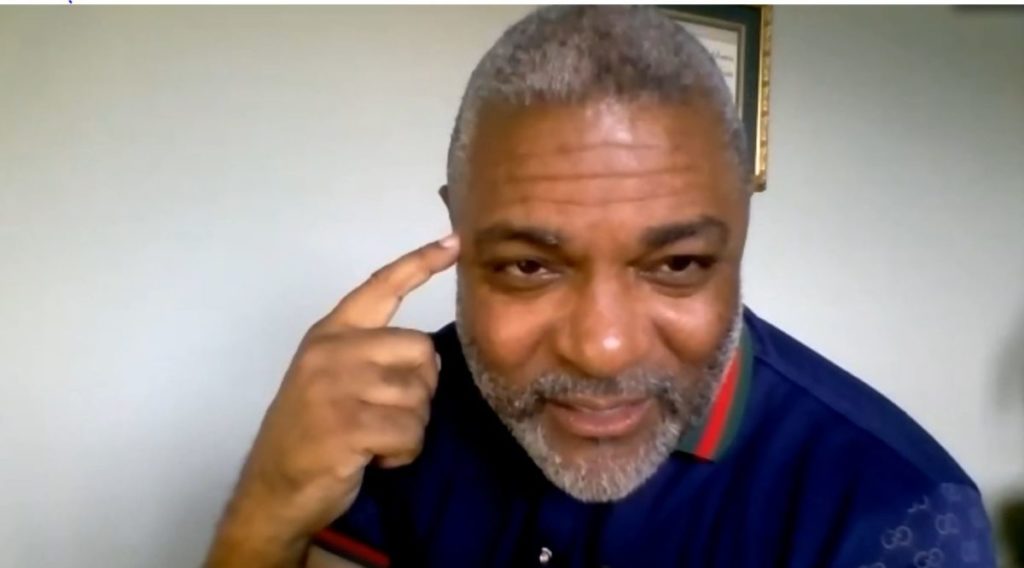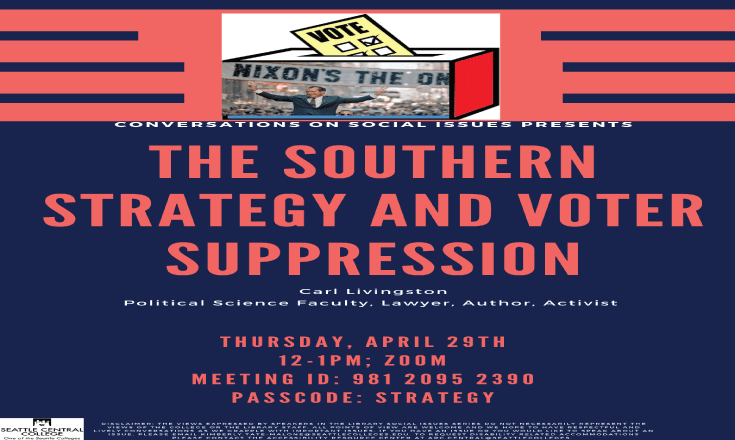On Thursday, April 29, Central’s library hosted another COSI discussion centered around voter suppression. The COSI, called “The Southern Strategy and Voter Suppression” explored current Republican efforts across the nation limiting access to voting after fraudulent claims of the 2020 presidential election alongside key leaders like President Reagan’s political consultant Lee Atwater and President Nixon in perpetuating the Southern Strategy- a practice to undo civil rights progress for the conservative vote.
Hosted by Kimberly Tate-Malone, Central library faculty, the talk featured political science faculty member Carl Livingston and Equity, Diversity and Inclusion office Director Dr. Valerie Hunt.
Reciting “For My People”, written by Margaret Walker, an American poet considered a leader for Black literary movements in the 20th Century, Dr. Hunt brought to life the sentiments Walker describes- such as the distress, reality, and hope of being a Black American.
Livingston began to present on the two notable topics of the afternoon- voter suppression and the Southern Strategy. He says voter suppression is the practice of legal and illegal measures preventing voters from being able to exercise their right to vote. Historical examples include poll taxes and literacy tests, but today take form as ID requirements and limitation of voting times.
Similarly, the Southern Strategy is a national effort, which Livingston described has become local, to gain the conservative vote by reversing civil rights achievements made in the 1950s-1970s, including efforts to expand access to voting.
“One [is] immediate action being done by way of voter suppression. But the overarching thing that this fits into, most people don’t even know the name of, and too many that know the name, still don’t believe it, so they don’t use it”, says Livingston, referring to the Southern Strategy.

He described specific policies that are targeted by voter suppression and the Southern Strategy: the Civil Rights Act of 1964, the Voting Rights Act of 1965, the Civil Rights Act of 1968, the Great Society Programming, Bussing, and even Affirmative Action. These policies and practices ended public segregation and housing discrimination; voting suppression through poll taxes, literacy tests, grandfather clauses; bussing practices; and supported efforts like Head Start, Medicaid, and affirmative action- which provides more opportunities for underrepresented demographics notably in college.
Livingston then explained five positions of how the Southern Strategy method is viewed- diverse perspectives that depict the multi-faceted reality of discrimination and oppression.
One position claimed by some is that the Southern Strategy is non-existent, or a hoax. He used commentator Candace Owens and Rep. Tim Scott- who side conservatively on racial issues despite being African-Americans themselves, to describe how Black people can be used as tools to sustain this position.
“Part of that Southern Strategy method is to use that group to speak for you, so that the white males can hide behind,” says Livingston. “And we fall into this method every time.”
Another perspective is that though Republicans are largely responsible for hindering civil rights achievements, Democrats are also responsible for not doing enough in response or using “soft power” to still perpetuate the Southern Strategy.
“I know how Democrats use the Southern Strategy,” Livingston continues, “they promise to move you forward, and they don’t.”
In his presentation, Livingston also detailed positions that believe President Nixon, who began the Southern Strategy efforts, was the only one who practiced that methodology; that Nixon and President Reagan, his predecessor, practiced it; and that only Republicans have continued to sustain those efforts.
Livingston, also a lawyer, activist, author, and more, also highlighted some of the manuscripts he’s planning on publishing that center on the afternoon’s conversation- including one titled “How President Biden Can Bring Racial Light”.
He concluded the event by describing the impact of voter suppression and the Southern Strategy- lost equality and estimated progress that has been stalled. Livingston continued that when there is a clear case of racial discrimination, the burden falls to the government to prove it’s legitimacy through legal processes.
“Anything that hurts Blacks worse than Whites, with the history that we have, I think I can show legally and politically it’s the Southern Strategy,” says Livingston of evaluating the intention of government leaders and legislature.
He then posed questions for the audience to discuss, such as: does the Southern Strategy explain discrimination in the U.S. since the 1960’s or has the case for it still not been sufficiently made. Participants were also able to share other questions about the program.
Those interested in seeing the materials from the event, such as the presentation, can visit the library’s COSI page. The library has also provided web resources, books, and videos related to the event’s topics.
Author

Alexa is an avid journalist seeking an A.A. with an emphasis on Global Studies at Seattle Central College. She's interested in pursuing investigative journalism to report on social struggles like immigration, civil rights, and access to education in South and North America. She is currently working to cover budget cut reforms at Central and civil rights movements in Seattle. Alexa is also a Youth Council Member at OneAmerica, advocating for greater access to quality education for immigrants and refugees in WA. She is a first-generation American who has travelled to 13 countries to explore world cultures and politics.







Be First to Comment